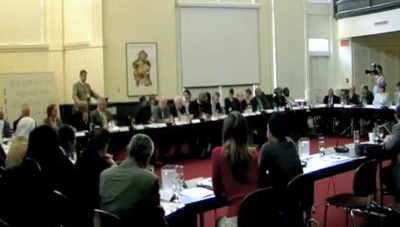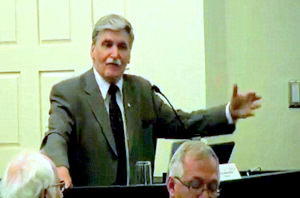SEARCH
 Still, eighty faith leaders were gathered in Winnipeg for their own assembly. While they were confident they had something important to say, many had been through this before, and they kept their expectations modest.
Still, eighty faith leaders were gathered in Winnipeg for their own assembly. While they were confident they had something important to say, many had been through this before, and they kept their expectations modest.
 Media analysis of the maternal health initiative was more positive.
“The total contribution – $7.3-billion over five years – is big enough to save many lives,” judged the Globe and Mail's editorial. But Canada’s generous contribution to that fund will likely pull resources from other international aid commitments, since there is no corresponding increase to the overall foreign aid budget.
“Maternal health runs the risk of being the latest flavour-of-the-month of international summitry,” the Globe concluded.
If the faith leaders had no dramatic impact on the results of the G8/G20, they cannot be faulted for their effort, given that their's was the most substantial lobbying effort directed at the summits. Together, the delegates represented millions of believers from their diverse religions. It could be there, in the leaders’ own churches, temples, mosques and synagogues, that the World Religions Summit finds its legacy.
Their declaration included an ad intra component that affirmed that religious communities “share responsibility to be and act for the change we want to see”. First, they unanimously agreed to “condemn religiously motivated terrorism and extremism and commit to stop the teaching and justification of the use of violence between and among our faith communities.”
They added six more commitments to their initial draft:
Media analysis of the maternal health initiative was more positive.
“The total contribution – $7.3-billion over five years – is big enough to save many lives,” judged the Globe and Mail's editorial. But Canada’s generous contribution to that fund will likely pull resources from other international aid commitments, since there is no corresponding increase to the overall foreign aid budget.
“Maternal health runs the risk of being the latest flavour-of-the-month of international summitry,” the Globe concluded.
If the faith leaders had no dramatic impact on the results of the G8/G20, they cannot be faulted for their effort, given that their's was the most substantial lobbying effort directed at the summits. Together, the delegates represented millions of believers from their diverse religions. It could be there, in the leaders’ own churches, temples, mosques and synagogues, that the World Religions Summit finds its legacy.
Their declaration included an ad intra component that affirmed that religious communities “share responsibility to be and act for the change we want to see”. First, they unanimously agreed to “condemn religiously motivated terrorism and extremism and commit to stop the teaching and justification of the use of violence between and among our faith communities.”
They added six more commitments to their initial draft:
We reaffirm our own commitment to call on our communities and members to: -demonstrate solidarity with the poor and vulnerable in our society and the globe; -monitor the compliance of our governments in meeting the Millennium Development Goals and, whenever possible, hold them publicly accountable for such compliance; -confront consumerism, reduce consumption and change our lifestyle to give testimony to better stewardship and live more lightly on the Earth; -cultivate the positive peacebuilding influence of religion and invest in building the capacity of our communities to participate in peacebuilding and peacekeeping activities; -promote co-existence among different religious and ethnic communities while welcoming immigrants and refugees; and -grow the collaboration of faith traditions to provide leadership, research and action, work to engage our own communities on the issues, and maintain continuous consultation and evaluation of these global political summits in the coming years while building political support for the changes we seek.Even if government leaders pay no heed to the wisdom of religion, these internal commitments ensure the relevancy of gatherings like the World Religions Summit. If religions cannot rouse the consciences of today's political elites, they can raise up new generations of leaders who are committed to upholding human dignity and promoting responsible governance. Rev. Matale left Winnipeg for Zambia certain of this. “If it doesn’t impact on the leadership of the so-called G8 and G20,” she said, invoking a preacher's passion, “it has an impact on me. And I have a responsibility to ensure that the impact is felt at least in my little world.” S+L will air a special Catholic Focus on the World Religions Summit this fall, hosted by Jenna Murphy. More details will be posted on the S+L Blog in the coming weeks.